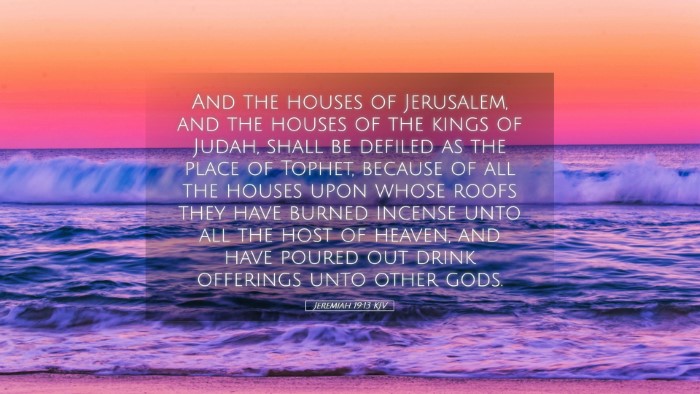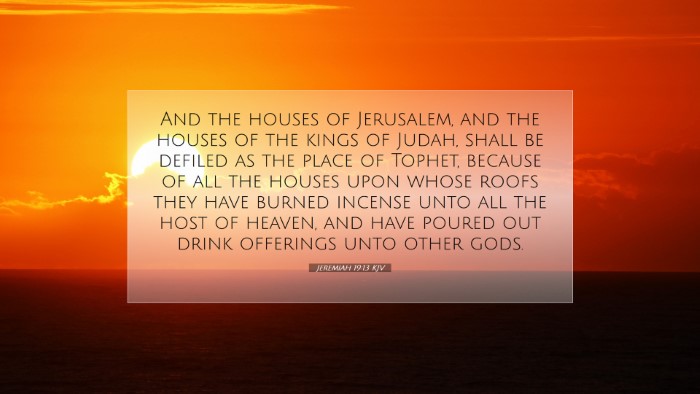Commentary on Jeremiah 19:13
Verse Reference: Jeremiah 19:13 - "And the houses of Jerusalem, and the houses of the kings of Judah, shall be defiled as the place of Tophet, because of all the houses upon whose roofs they have burned incense unto all the host of heaven, and have poured out drink offerings unto other gods."
Introduction
This verse provides a deep insight into the judgment of God upon Jerusalem. The prophet Jeremiah, as a voice of the Lord, reveals how the sin of idolatry, particularly in the burning of incense and offering sacrifices to false gods, has tainted even the most sacred places. The warnings and prophecies concerning Jerusalem confront not only the severity of their transgressions but also the implications for the community.
Insights from Public Domain Commentaries
Matthew Henry's Commentary
Matthew Henry emphasizes that the defilement of the houses in Jerusalem is a direct consequence of idolatrous practices. He notes that the rooftops, where the people publicly displayed their devotion to celestial bodies and false deities, symbolize a blatant rebellion against the true worship of God. Henry elaborates that the Lord's judgment extends beyond mere physical places; it reflects the spiritual state of the people.
- Judgment and Defilement: Henry correlates the destruction ordained for Jerusalem with the defilement introduced by sinful practices, emphasizing that what once was a sanctuary has become akin to the heathen places of worship.
- Call to Repentance: His commentary encourages a profound self-examination for believers today, urging them to consider the implications of their spiritual lives and the places they inhabit.
Albert Barnes' Notes on the Bible
Albert Barnes regards this passage as a solemn warning regarding the consequences of persistent idolatry. He highlights the metaphorical and literal ruin that will befall the city due to their unfaithfulness. Barnes' interpretation points to the historical context of the inhabitants of Jerusalem and their disregard for God’s commandments.
- Cultural Context: Barnes contextualizes the worship of the 'host of heaven' within the cultural practices of the people, suggesting that adopting such practices was directly violating the covenant with Yahweh.
- Symbolism of Tophet: He discusses Tophet, a site associated with infant sacrifice, emphasizing its association with great moral and spiritual degradation – serving as a stark reminder of the gravity of their sins against God.
Adam Clarke's Commentary
Adam Clarke presents the verse with a focus on the profound dichotomy between devotion to the Lord and the worship of other gods. He points out that the rooftops were likely used for worship as they provided visibility to the celestial bodies worshipped by the people.
- Public vs. Private Worship: Clarke comments on the visibility of sin—how their public acts of idolatry echoed throughout the land, dishonoring the sacredness of their surroundings.
- Theological Implications: He also draws out the theological insights, suggesting that the mysterious heavens worshiped should not inspire reverence but highlight the folly of worship that displaces the Creator.
Theological Reflection
The shared themes among these commentaries provide critical insight for pastors, students, and theologians. There is a palpable emphasis on the necessity of true worship and the repercussions of straying from it. This verse serves as a reminder that the spiritual condition of a community directly impacts its physical and social environment.
- Idolatry in Contemporary Context: The neglect of true worship can lead to analogous desolation in modern contexts, urging a reassessment of priorities in faith communities.
- Call to Authentic Worship: The alarming nature of this prophecy beckons believers to engage in authentic worship practices that honor God and protect their communities from moral and spiritual ruination.
Conclusion
Jeremiah 19:13 not only presents a striking picture of divine judgment but also serves as a grave caution to the people of God throughout history. Reflecting on this verse through the lenses of Henry, Barnes, and Clarke, enables us to understand the depth of God's displeasure and the importance of worshiping Him alone. This verse stands as a critical pedagogical tool for anyone studying the complexities of faithfulness and idolatry in both historical and contemporary settings.


